First-year Elon Law students engaged in leadership education through the law school's nationally unique Lawyering, Leadership and Professionalism course during Winter Term.
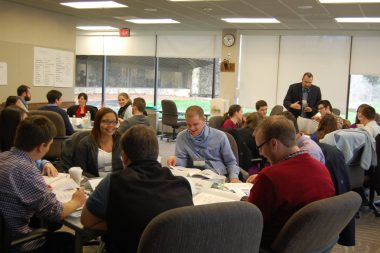
A staple in Elon Law’s program of legal education, the course is designed to expose students to key leadership skills and concepts that enhance their ability to excel in the legal profession and to solve challenges at regional, national and international levels. Areas of focus include legal problem solving, team dynamics, leveraging diversity to improve business outcomes in the legal workplace, professionalism in the practice of law and creation of individual development plans to achieve short- and long-term educational and career goals.
Professor of Law Faith Rivers James, the director of leadership programs at Elon Law and the professor for the course, wrote about the value of the Lawyering, Leadership and Professionalism course and the overall leadership program at Elon Law in a St. Louis Public Law Review article.
“Embracing leadership as a critical lawyering skill, Elon University School of Law‘s Leadership Program prepares law graduates for the responsibility and demands of leadership in professional, political, and community endeavors,” Rivers James wrote. “There is natural nexus between legal training and leadership. Lawyers‘ analytical skills and unique qualification to draft, assess, and adopt laws and regulations place attorneys in the intersection of leadership in the public arena of business, politics, and civic life.”
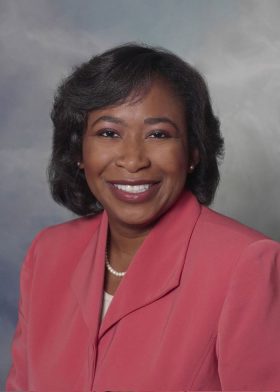
The 2013 Lawyering, Leadership, and Professionalism course introduced students to a number of concepts that provided an analytical framework for understanding leadership and encouraged participation in various activities that promote professional growth.
“Empowered with self-assessments and skills training at the outset of their professional school training, students develop lawyering skills and emotional intelligence capacities that support their professional development later in their careers,” Rives James wrote.
Students in the course had the opportunity to study at the Center for Creative Leadership (CCL), a top-ranked global provider of executive education, headquartered in Greensboro.
“The best part of the course was the trip to the Center for Creative Leadership,” said Daniel Watts L’15. “It is truly amazing to go to such an organization and to partake in such sought-after training as a first-year law student. In many ways it is hard to appreciate the privilege of being at CCL, until you pass a room full of CEOs or VPs going through the same exercises as you and your classmates.”
After participating in leadership and problem solving activities and workshops at CCL, students received feedback from Elon Professor of Leadership Studies, Dr. Roland Smith, who is also a senior faculty member and lead researcher at CCL.
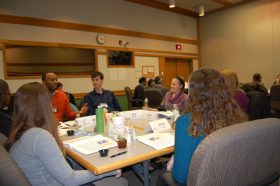
“The Center for Creative Leadership gave us the opportunity to learn more about group dynamics and about what each one of us brings to the table,” said Shoshanna Silverberg L’15. “I appreciated the collaborative approach that the course offered through small group workshops at CCL and the high value it placed on teamwork throughout the course.”
In the course, students engaged in problem-solving case studies recently developed by Harvard Law School professors, including Ashish Nanda, Todd Rakoff and Joseph William Singer.
Rakoff, the Byrne Professor of Administrative Law at Harvard, said he was pleased to see other schools using the problem-solving case studies approach.
“The most fundamental benefit for first-year students is that by giving them problem based cases, as opposed to appellate court cases, you’re giving them a client and you’re asking them to think of how the law can help solve the client’s problem, whereas appellate court cases, unless the teacher is unusually skillful, end up teaching students how to think like a judge,” Rakoff said.
At Elon, the case studies were taught in sections by Rivers James and fellow Elon Law Professors Andy Haile, David Levine and Robert Parrish.
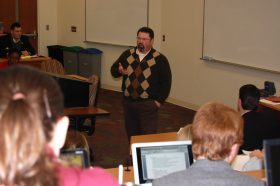
“This component of the course provides the first exposure to client problems before the appellate level of cases that students encounter in the core doctrinal courses, learning to counsel a landlord client before a landlord-tenant issue goes to court, and dealing with a poorly drafted contract ‘gone bad,’” said Rivers James.
“Teaching in the leadership program gave me the opportunity to introduce my incoming Contracts II students to the challenges and rewards of mining a complex fact pattern for key facts,” Levine said. “Additionally it allowed me to ask my favorite question: what would you do you differently.”
Students in the course said the case studies helped them to explore business and ethical dimensions of law practice in addition to examining specific aspects of contract and property law.
“Professor Levine took the leadership case studies a step beyond basic legal analysis, holding up our intellectual property case as an example of the importance of ethics in the legal profession, which he then colored with war stories from his own experience in practice,” said Emily Seawell L’15. “The course encouraged us to consider not only the facts of a case, but also how we can use everyday interactions as a vehicle to further the development of the legal profession.”
“Overall I felt the case study was an excellent vehicle to incorporate our studies from the first semester into a larger problem of business and legal ethics,” said Christopher Genheimer L’15. “Additionally, I felt the case study was an effective way of simulating a real world legal problem in a classroom environment. The case study allowed us to collaborate in teams to discuss, analyze, and provide legal advice to the parties involved in a manner similar to what would occur in the workplace.”
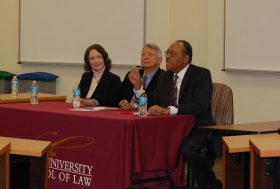
While problem-solving case studies were a new addition to the course, the annual Leadership Panel featuring former Chief Justices of the North Carolina Supreme Court has been a favorite event among students in the course for years. This year was no exception as former Chief Justices Rhoda Bryan Billings, Jim Exum and Henry Frye spoke with students about their careers and the qualities they value in lawyers. All three justices are also members of Elon’s Law School Advisory Board.
“Lawyers need to be self-aware and have very high social IQ’s to be advocates, not just legal acumen,” said Daniel Watts L’15, reflecting on the Leadership Panel. “The 1L Winter Term experience is a crash course in growing the human element of being a lawyer. It is easy to get caught up in the rigors of law school and forget that we are people first. Human capital drives what we do, and what we strive to do.”
In an effort to highlight the challenges and opportunities of leadership in diverse settings, students participated in a workshop organized by the Anti-Defamation League, an organization that opposes all forms of bigotry. The workshop, “Workplace of the Future,” was facilitated by Anti-Defamation League staff members Jack Zaccara and Erin Lee, who have conducted this training in law firms and various government and corporate legal departments across the country.
“Although the course is built on leadership principles, one of the things that impressed me most was its parallel emphasis on diversity,” said Seawell. “Through the ADL training, the teamwork exercises at CCL, and the focus on developing individual awareness, we learned that being an effective team member isn’t just about tapping into your own strengths; it’s about valuing your team members’ perspectives, understanding how you fit into the group dynamic, and unlocking the potential of the entire team.”
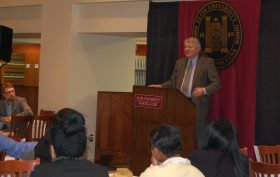
The course ended with a keynote address delivered by North Carolina Bar Association President-elect Alan Duncan, who discussed the value of lawyer-leaders who serve their clients and communities with integrity.
“Many of your clients will come to you facing the most difficult circumstances of their lives, “ Duncan said. “They will entrust you to help them through that difficult time. I urge you to use the gift that you will have as a lawyer, a license to help others. Use it wisely and with integrity in the noble sense of all the good that is in our profession.”
Other faculty members and community leaders assisted Rivers James throughout the course. Distinguished Leadership Coach in Residence John Alexander led executive coaching activities. Assistant Dean for Elon Law’s Center for Professional Development Dr. S. Christian Smith led a professional development session that featured insights from Deborah Hayes, General Counsel at Lincoln Financial, and two Elon Law alumni, Tiffany Atkins L’11, an attorney with Legal Aid of North Carolina, and Stephen Shaw L’11, an attorney with Womble Carlyle Sandridge & Rice, LLP.
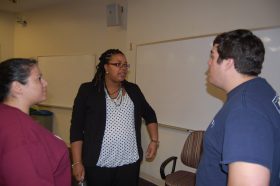
Additionally, several professors, lawyers and business professionals served as faculty and executive coaches, helping students in a variety of ways, including the development of personal and career goals through creation of Individual Development Plans. Contributors included: Richard Craig, staff attorney with Legal Aid of North Carolina; Bill Eagles, Greensboro attorney and adjunct faculty member at Elon Law; Mona Edwards, Vice President, Chief of Staff and Secretary to the Board of Governors at the Center for Creative Leadership; Ronnie Grabon, adjunct faculty member at Elon Law, human resources consultant and executive coach; George R. Johnson, Jr., dean of Elon Law; Dr. Chris Leopold, associate professor of psychology, faculty research fellow and coordinator for the leadership studies minor at Elon University; Lewis Pitts, senior managing attorney for Legal Aid of North Carolina Advocates of Children’s Services; Alexis Martinez-Fedrizzi, assistant dean for student affairs at Elon Law; Bonnie McAlister, executive coach in residence at Elon Law; and Jonathan Wall, member of Elon’s Law School Advisory Board and an attorney with Higgins, Benjamin, Eagles & Adams, PLLC.
More information about Elon Law’s Leadership Program is available here.


